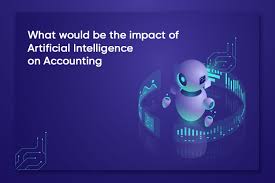Source: it.toolbox.com
Not that long ago it was thought that artificial intelligence (AI), robots, and machine learning (ML) were things found only in science fiction movies. Today this form of technology takes the center stage around the globe in workplaces.
Basically, AI technology is a sort of smart machine, capable of accomplishing routine, boring activities at a fraction of the time and with greater precision. Machine Learning advent now enables AI systems to track, evaluate, and self-learn data and processes in order to enhance their efficiency and accuracy over time.
The cutting-edge technology and automation would have an advantage for accountants, too. It is already being deployed in the industries on multiple fronts, and will only increase the number of applications.
AI Will Help in Transforming Accountants
There is no doubt that AI can perform many of the traditional accounting tasks faster and more effectively than humans and such capabilities will keep growing with the time, but this does not mean the end for accountants. On the other hand, there will always be a need for the human element or human intelligence in each industry.
Accountants need not worry about replacing their job with AI any time in the near future. Companies will still need accountants capable of analyzing and interpreting AI data and providing consultancy services. AI technology should change the duties that an accountant performs, rather than eliminating the position of an accountant.
How Artificial Intelligence Is Helpful in the Accounting Field
AI is already present in accounting and continues to simplify and reduce dependency on manual data entry. AI technology has started being used in a number of benefits and its results are wonderful.
Scaling up data analysis, quantity and quality: AI can process huge amounts of data (structured and unstructured), and boost the scale, scope, and rigor of the analysis. AI can literally analyze all of the transactions available.
Improving observation and recognition capabilities: AI can gain information, identify weak signals, and detect more complex patterns than humans can do.
Thorough cognitive capacity: AI can learn from mistakes or new cases automatically and immediately using feedback loops, and becomes gradually smarter over time. It never forgets, builds on, and deepens on the corporate memory.
Improving consistency: AI can make decisions that are far more consistent. Robots are not distracted, fatigued, irritated, moody, tired, angry, hungry, thirsty, or sickened. Machines are not affected by cycles or fluctuations in such biological or physiological states as humans. They also do not take holidays or a leave of absence.
Mitigating repetitive tasks: Instead of spending too much time on tedious activities like data analysis and manual examination processes, accountants should focus their attention on all the work that requires a human touch. Accounting errors may go unnoticed in a typical bookkeeping environment. AI will automatically detect errors and ensure your books are always correct.
Faster clearance of invoices: It can be difficult to deal with payments from several invoices. Machine learning helps AI to analyze the data and clear up or create new invoices.
AI technology evolution will also enable accountants to be “tech-savvy” with very human skills — the ones unattainable by machines — such as storytelling, successful communication, and building relationships.
The accounting industry is changing, and practitioners need to adapt and learn how to respond effectively to those changes. While AI is a wonderful technology and we often imagine machines to replace humans, we can’t underestimate the value of pure human skills such as excitement, imagination, or empathy, and all of them are every profession’s important facets.


